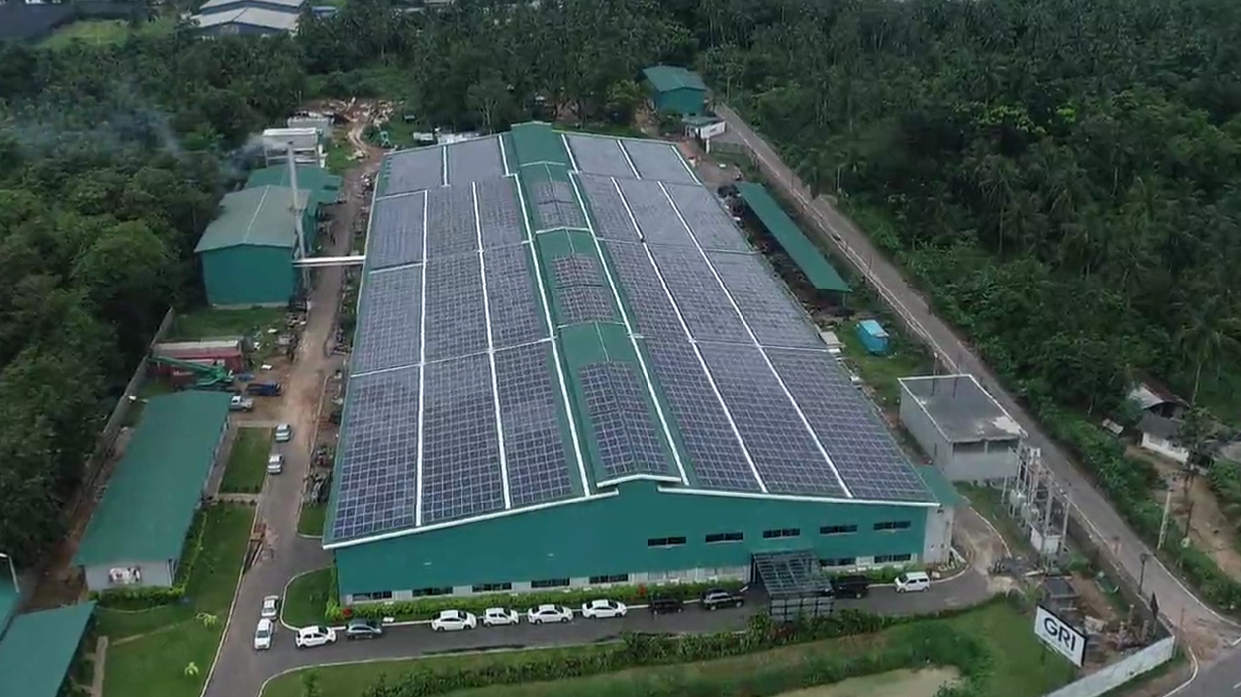Sri Lankan industries going solar
11 January 2024 UNIDO

Image: The solar panel system installed on the roof of the Colombo factory of tyre manufacturer Global Rubber Industries.
Sri Lankan industries are at a crossroads. The country’s reliance on imported fossil fuels has seen operating costs skyrocket as the global energy crisis bites.
And with the island country one of the most vulnerable to climate change, the need to move to renewable energy has never been greater. With sunshine abundant in Sri Lanka, solar provides one of the biggest rays of hope for this green transition.
Through its Nationally Determined Contributions, the Sri Lankan government has pledged that 70% of its energy will come from renewable sources by 2030. The country already has a well-established solar sector. This commitment has helped to invigorate it further, and an increasing number of Sri Lankan businesses are now reaping the cost and environmental benefits of sunshine-powered energy.
But more is needed to scale-up solar – and one of the best ways to do this is to have more supportive financing, policy and regulations in place.
To help make this happen, UNIDO brought together 35 representatives from commercial banks and financial institutions, power and energy regulators, and policymakers from key government ministries for a two-day training workshop. The aim was to equip these industries to use solar and for solar businesses to thrive.
“The idea is to bring Sri Lanka to the next level on solar,” says Channa Silva, a solar PV expert who co-facilitated the course. “Globally, solar projects are happening on a very large scale, but in Sri Lanka the scale is smaller. To meet its net zero targets, the government is aiming for a much larger stake from renewable energies in the energy mix, and we need to be scaling up things like solar. This training was about what actions regulatory and financial institutions can take to improve their systems, policies and regulations to make it happen.”
The first edition of the workshop took place in Colombo in June. The course covered both solar PV energy and solar thermal energy, and was a mix of classroom-based learning and field trips to see these technologies being used by Sri Lankan businesses. Participants gained insight on the Sri Lankan energy electricity market and the global market, how both types of solar technology work, the country’s current regulatory environment and its bottlenecks, and the key financial aspects that need to be considered when investing in solar.
“Most of the financial institutions are using traditional investment pathways. This course looks at the different things they can do to enhance industrial capacities [for solar],” explains Channa. “Issues like what are the calculated risks they can take, what they should set as payback time. Financial institutions want to have proper knowledge so when they are referring to feasibility studies and issuing loans they are making the right decisions.
“With policymakers and regulators, we were looking at what we can change in our regulatory framework. For example, when it comes to approvals or permits, what are the flexibilities they can give to expedite this type of work? The course covered all the things that will help to expand the solar market to a different level of capacity.”
The engagement from the first training cohort has been encouraging, and similar trainings are planned for 2024. One of the biggest successes was that participants were able to learn from each other, as well as the UNIDO experts running the course.
“The response was very good,” says Channa. “They were asking lots of questions, and discussions really got going because there was a wide, diversified range of experts so there were different opinions. A question would lead to my answer but also to views from others in the class, which really helped to take things forward. I’ve conducted trainings around the world, but this one was so participative. It was also important for me because Sri Lanka is the place where I belong, so it felt very special.
“A number of people raised issues about the permitting stage of a project, which can take a long time in Sri Lanka and that’s a hassle from a financing perspective. So with the regulators in the room we were able to discuss what solutions can be found. And we were able to give some advice to policymakers about the things they should focus on to address this issue.
“The senior government officials came away with a good idea about what exactly needs to be done to improve the sector, as well meeting the national targets on renewable energies in the long run. They came away with ideas on the things they can do to encourage more investors to come to this country so we can increase solar on the scale that we need.”
The training was delivered as part of Accelerating Industries’ Climate Response in Sri Lanka, a programme led by the Ministry of Environment, Ministry of Industries and Ministry of Power and Energy, implemented by the UNIDO and funded by the European Union under the Global Climate Change Alliance+.
Originally published on the Accelerating Industries’ Climate Response in Sri Lanka website.